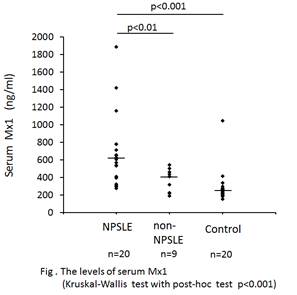Session Information
Session Type: Abstract Submissions (ACR)
Background/Purpose: Nervous system disease is one of the most common manifestations in patients with systemic lupus erythematosus (SLE) that significantly affects morbidity and mortality. Due to the complexity of clinical presentation of neuropsychiatric lupus (NPSLE), there are no specific markers for the diagnosis or for the evaluation of disease activity. A link between type I interferon (IFN) and SLE has been established by a series of studies. Recent studies have shown up-regulated IFN-inducible genes in the peripheral blood of lupus patients, which is correlated with disease activity1). We previously reported that gene expression levels of Mx1 (myxovirus resistance protein 1), one of the IFN-inducible genes, was increased in lupus peripheral T cells compared with healthy controls2). But it has not been revealed how the overexpression of Mx1 affects specific organs in lupus patients. Based on the report detecting Mx protein in active lesions of brain tissues from patients with multiple sclerosis (MS)3), we hypothesized that Mx1 is one of the factors related to the pathogenesis or the biomarker of NPSLE.
Methods: This study comprised 20 patients with NPSLE, 9 patients with SLE who were not considered NPSLE (non-NPSLE), and 20 patients with other non-inflammatory neuropsychiatric diseases as a disease control group. We evaluated the level of Mx1 in serum and cerebrospinal fluid (CSF) by enzyme-linked immuno-sorbent assay (ELISA). There was no significant difference in disease activity (SLEDAI) between those with NPSLE or without.
Results: The levels of Mx1 in serum and CSF were correlated in patients with SLE (R=0.36). The levels of Mx1 in CSF were higher than that of serum in both patients with NPSLE (p<0.05) and non-NPSLE (p<0.05). The levels of serum Mx1 were significantly higher in patients with NPSLE than in those with non-NPSLE and other non-inflammatory neuropsychiatric diseases (p<0.01, p<0.001, respectively, Figure). The levels of Mx1 in CSF were significantly higher in patients with NPSLE than in those with other non-inflammatory neuropsychiatric diseases (p<0.001).
Conclusion: The upregulation of Mx1 was significantly correlated with NPSLE, suggesting that serum Mx1 is one of the candidates of biomarker for NPSLE.
Reference: 1) Feng X et al. : Arthritis Rheum. 2006 ; 54(9), 2) S. Yasuda et al. : EULAR, 2009, [THU0124], 3) Al-Masri AN et al. : Eur J Neurol. 2009 ; 16(6)
Disclosure:
Y. Shimizu,
None;
S. Yasuda,
None;
T. Kurita,
None;
S. Shimamura,
None;
I. Nakagawa,
None;
A. Noguchi,
None;
H. Shida,
None;
T. Watanabe,
None;
M. Kono,
None;
K. Oku,
None;
T. Bohgaki,
None;
O. Amengual,
None;
T. Horita,
None;
T. Atsumi,
None.
« Back to 2014 ACR/ARHP Annual Meeting
ACR Meeting Abstracts - https://acrabstracts.org/abstract/upregulation-of-myxovirus-resistance-protein-1-in-patients-with-neuropsychiatric-systemic-lupus-erythematosus/

